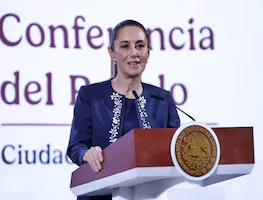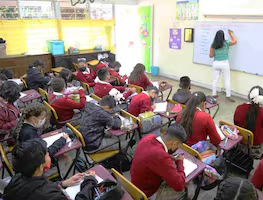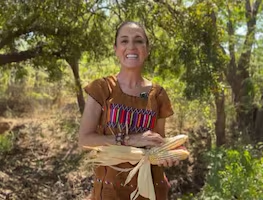Más Información

Claudia Sheinbaum, por definir asistencia presencial a reunión "urgente" de la Celac; migración, tema clave del encuentro

Noroña califica política de EU como hipócrita, racista y fascista; se solidariza con Petro ante deportaciones

Magistrada Mónica Soto propone sustituir al Comité de Evaluación del PJ; plantea someter a insaculación a aspirantes elegibles

Magistrado Reyes Rodríguez propone validar registros de aspirantes con promedio inferior a 8; excluirlos es “estigmatizante”, señala

¿Eres madre trabajadora? Puedes acceder a las guarderías del IMSS; descubre los requisitos y cómo hacerlo
Over 11,000 km of coast and 8,000 square km of water mirrors, lagoons, estuaries, and dams, in addition to thousands of km of highways , will be left without supervisors during 2020 due to federal congresspeople eliminating the resources destined to the surveillance program of the National Fishing Commission (Conapesca) from the Federation’s Expenditures Budget .
Anselmo López Villalobos
, a member of the National Committee of the Confederation of Fishing Cooperatives of Mexico and Commissioner of the Fishing Ports of the Pacific, warns that the deep-sea fishing industry will face an uncertain fate.
López Villalobos explains that in 2020, the fishing sector will have MXN $1.2 billion in contrast to the MXN $1.7 billion it used this year and the MXN $3.8 billion of 2018.
Did you know
?
In addition, he says, from those MXN $1.2 billion that Conapesca will use in 2020, approximately MXN $800 million will be used for wages , the gasoline of directors , and stationery . “There will not be a single peso for sector programs next year,” he asserts.
In Mexico, 15 coast entities with fishing activities, like Sinaloa, Sonora, and Oaxaca, are located in the Pacific Ocean ; and Veracruz, Tamaulipas, and Campeche, in the Gulf of Mexico , have no future. It includes 6,000 fishermen who work in approximately 1,200 vessels and to that number, we must add the indirect jobs.
For each fisher, at least four relatives are added who depend directly on this activity; in addition, there are the merchants and their families whose sales depend on the vessels.
“With those policies of sacrificing resources from the productive activities for social programs , we can see we’re going to lose food sovereignty . We are not against scholarships to the youth or migrants, but we are upset about their sacrificing resources from those who produce food,” he mentions.
Have you heard of
?
Fishers fear illegal fishing to increase in the ban season due to the lack of surveillance , which will affect species like shrimp.
According to the 2020 Budget , the sector programs, such as the supervision and surveillance against illegal fishing, will have no money. “Who will take care of our coasts, lagoons, estuaries, and dams in ban season if there will be no money for surveillance?” asks López Villalobos.
Deep-sea fishermen, he says, will be in ban season for six months for the catching of shrimp since February 2020 . Without surveillance and supervision, illegal fishing will increase; the most serious is that the reproductive cycle of sea species, like shrimp and fish, will be broken.
With it, there is the risk that in the regular season the volume of catchings diminishes significantly . Fishermen are afraid that each year there will be less food for policies that “sacrifice productive activities,” like fishing.
Did you know the
?
Taxes to diesel
Members of the National Committee of Fishing Cooperatives of the country warned, in a statement, that they will look for a meeting with the head of the Finance Ministry, Arturo Herrera , to propose a new scheme of incentives and supports to the fishing industry of the country.
In particular, deep-sea fishermen, who use sea diesel and fishermen of lagoon systems, who use gasoline for their corresponding vessels, commented that they will ask the Mexican government to eliminate the Special Tax on Products and Services (IEPS) that rises the price of fuel like diesel and gasoline.
Did you know
?
“We – insists Anselmo López Villalobos – produce food for the country and I think we need support from the federal government for the price of diesel and gasoline to be rid of the IEPS if they really want to bolster the development of southern Oaxaca and of the country with the I nteroceanic Corridor of the Isthmus .”
Otherwise, he warns, the fishing industry of Oaxaca and Mexico “will fade losing not only thousands of jobs but also food sovereignty. Our future is uncertain and we don’t know what will happen, but we’re not going to give up.”
Did you know a
?
mp





